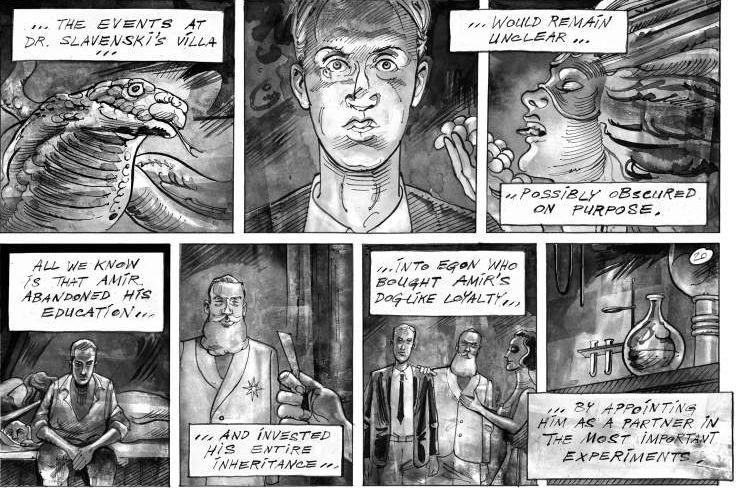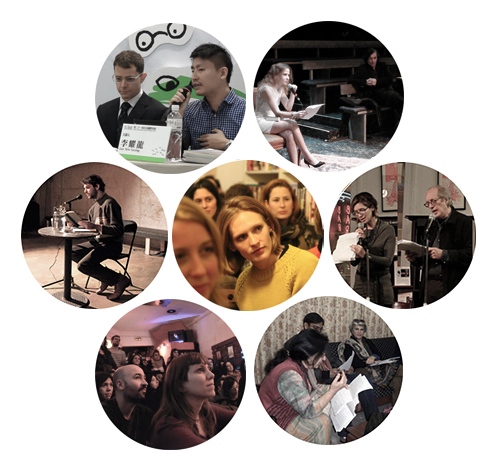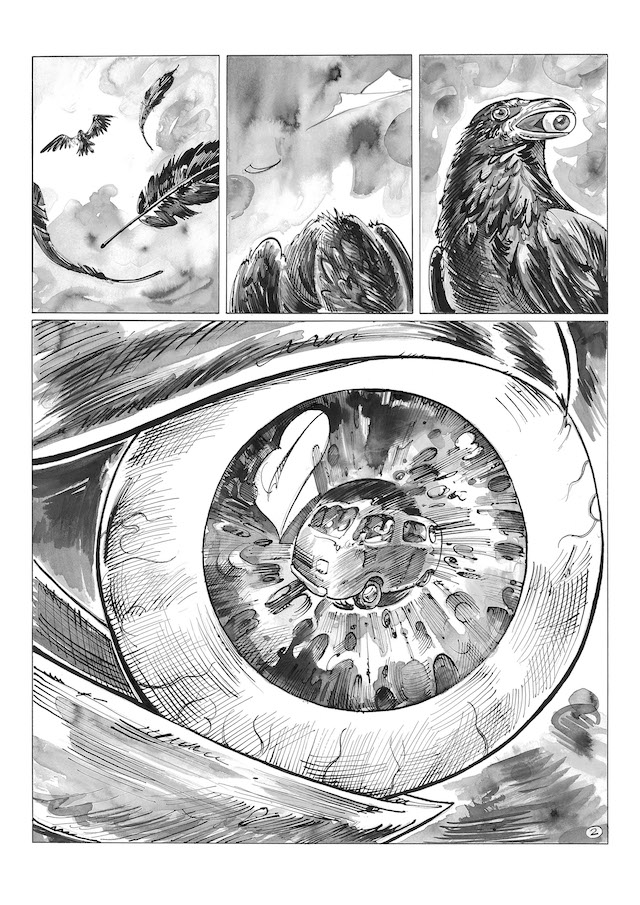Click here for Parts I and II in this series.
Multimedia
Graphic Novel in Translation: Karim Zaimović’s “The Invisible Man from Sarajevo,” Part III

Part III in Asymptote blog's first-ever graphic novel in translation
Graphic Novel in Translation: Karim Zaimović’s “The Invisible Man from Sarajevo”

Translating genre, language, text, and image—this is Asymptote blog's first graphic novel in translation
In this episode, we look at divergent forms of storytelling in translation—from the fact-centered world of literary reportage to the poetic proclamations of a third-millennium heart. Beatrice Smigasiewicz brings us coverage from Krakow’s Conrad Festival, where she caught up with one of Poland’s most prominent writers of literary nonfiction, Mariusz Szczygieł, and his award-winning translator, Antonia Lloyd-Jones. They discuss the legacy of 20th century reportage in Polish literature and the power of storytelling in dealing with the country’s wartime experience and postwar Communist era. Katrine Øgaard Jensen presents new translations of poems from Ursula Andkjær Olsen’s Third-Millennium Heart, an explosive collection that pushes story to the limit—breaking every rule of storytelling and yet bringing us a character who feels real. Olsen won the prestigious literary award Montanaprisen in 2013 for the book, excerpted here in its original Danish along with English translations.
Podcast: Play in new window
| Download
In this episode, we look at the concept of home; how we shape it and how it shapes us. Yardenne Greenspan takes a look at literature of trauma, bringing us work by two Israeli authors Yonatan Berg and Ron Dahan, who recount the horrors they have seen (and have been a part of) in their country, as well as Yehiel De-Nur better known by his pen name, Ka-Tzetnik 135633, a Holocaust survivor who in bitter detail recounts his time in Auschwitz. What unites these authors is their experience with LSD. Flashbacks to their traumatic experiences directly inform upon their writing and present the reader with a complex portrait of trauma. Daniel Goulden brings us a report from the Brooklyn Book Fair with recordings of Jonathan Lethem, Vivian Gornick, John Leguizamo, Cecily Wong, and Chinelo Okparanta discussing their respective homes and how that informs upon their work. READ MORE…
The Uncanny Listener… (Part 2)

More stories from the shadows, featuring Franz Kafka, Yoko Ogawa, Dean Paschal and Mansoura Ez-Eldin.
The Uncanny Listener: Stories from the Shadows (Part 2)
Podcast: Play in new window | Download
Subscribe: iTunes | Android | RSS
We’re back with a second portion of scary stories! Following on from last month’s episode, part two of our audio anthology ventures even further into the dark and dingy corners of world literature. This installment features haunting tales from Japan, Egypt, America, and the Austro-Hungarian Empire, with writing by Franz Kafka, Yoko Ogawa, Dean Paschal, and Mansoura Ez-Eldin. Along the way you’ll find a hallucinatory giant, a doll with a mind of its own, a hideously disfigured carrot, and the Statue of Liberty as you’ve never seen her before. Plus there’s a conversation with cultural critic Adam Kotsko about the epidemic of creepiness on our TV screens, from Happy Days to Mad Men to the Burger King commercials. Join us as we continue exploring the questions: What is the uncanny? And why do we enjoy it so much?
The Uncanny Listener: Stories from the Shadows (Part 1)

Our newest podcast episode features creepy stories by Bruno Schulz, Ambrose Bierce, John Herdman and Felisberto Hernandez.
The Uncanny Listener: Stories from the Shadows (Part 1)
Podcast: Play in new window | Download
Subscribe: iTunes | Android | RSS
What exactly is “the uncanny“? We’ve all felt the sensation of a bloodcurdling shiver running down our spines, but when it comes to describing what that means or what caused it, we’re often left with nothing but: “it was just . . . creepy.”
In the latest episode of the Asymptote Podcast, we explore the mysterious and alluring phenomenon of getting the creeps, through the words of some of the best scary-storytellers in world literature. The Uncanny Listener: Stories from the Shadows is a chilling collage of readings that reveal the strangeness of what’s familiar and the familiarity of what’s strange. READ MORE…
In Praise of Translation

An all-new podcast episode! Listen to some of the best moments from our live event in London
If you missed our fourth anniversary event in London this January, never fear! Our newest podcast episode brings you highlights from the evening. Listen to Adam Thirlwell, Daniel Hahn, Stefan Tobler and Deborah Smith discuss books they love, translation pitfalls they avoid, and the meaning of the German euphemism “to shake the coconut from the palm tree.”
Podcast: Play in new window | Download
Subscribe: iTunes | Android | RSS
About the speakers:
Stefan Tobler is the publisher at And Other Stories, a young publishing house whose titles include the Booker Prize shortlisted Swimming Home by Deborah Levy and much literature in translation, including the Latin American authors Juan Pablo Villalobos, Iosi Havilio, Carlos Gamerro, Haroldo Conti, Yuri Herrera, Rodrigo de Souza Leão and Paulo Scott. He is a literary translator from Portuguese and German. Recent translations include All Dogs are Blue by Rodrigo de Souza Leão, Água Viva by Clarice Lispector and Silence River by Antônio Moura. @stefantobler and @andothertweets
Adam Thirlwell’s new novel, Lurid & Cute, was published in January 2015. He has written two novels, a novella, and a project with translations that includes an essay-book and an anthology edited for McSweeney’s. He has twice been selected as one of Granta’s Best of Young British Novelists. His work has been translated into 30 languages.
Daniel Hahn is a writer, editor and translator (from Portuguese, Spanish and French) with some forty books to his name. His work has won both the Independent Foreign Fiction Prize and the Blue Peter Book Award. He is currently chair of the Society of Authors and on the judging panel for the 2015 IMPAC Dublin Award.
Deborah Smith (@londonkoreanist) is the translator of The Vegetarian by Han Kang (Portobello Books, 2015). She has also translated The Essayist’s Desk and The Low Hills of Seoul by Bae Suah. She is currently in the final year of a Korean literature PhD at SOAS, and is setting up a non-profit publishing company which will publish translations from Asian and African languages, after apprenticing with And Other Stories.
Unveiling Our Winter 2015 Issue Video Trailer!

Get excited for Friday with this high-octane sneak peek at our 4th Anniversary issue, out January 30!
From the sparkly trailers for previous issues that you’ll find below to our beautifully designed website, with its gorgeous illustrations and immersive slideshows of visual art, Asymptote is committed to presenting and promoting its writers and artists in great style. If you like what we do, please consider donating to our campaign—only 30 more hours to go!
Mythology – Part Two

A brand new episode of our podcast! This time we're heading to Israel and Georgia...
Mythology – Part Two
Podcast: Play in new window | Download
Subscribe: iTunes | Android | RSS
In part two of our Mythology feature, we dig deeper into the rich and sometimes troubling relationship between legends of old and lives of present. Where do a nation’s myths come from? What does it mean to be both proud and critical of our cultural identity? How can art reconcile or challenge the way we relate to our heritage? We dive into these questions and more through a focus on two Western Asian countries: Israel and Georgia. Yardenne Greenspan, who grew up in Tel Aviv, examines her own difficulties with accepting the state-sanctioned version of history—she talks with fellow Israeli writers about the myths surrounding Israel’s public image. And Daniel Goulden and Rron Karahoda test out J.R.R. Tolkien’s theory as to why certain languages survive and others go extinct, through a celebration of Georgian music and folklore. READ MORE…
Our New Podcast Is Here!

Travel with us from indigenous Venezuela to Ancient Greece to modern Amsterdam in our first episode...
Mythology – Part One
Podcast: Play in new window | Download
Subscribe: iTunes | Android | RSS
At Asymptote we always try to experiment with different kinds of multimedia, and celebrate the full spectrum of language from the written to the visual to the spoken… So one day we thought: let’s make a podcast!
And here it is, our all-new audio adventure in which we explore some of the most fascinating ideas and issues in international literature. In each episode we’ll be making use of our global scope and travelling far and wide to bring you an eclectic sampler of interviews, readings and mini-documentaries from all over the literary world.
This quarter, we’re delving further into the Mythology theme of our October issue. These myths may be ancient, but they are far from dead. They’re the stories that define who we are today, our fantasies and our fears, our memories and our misconceptions. READ MORE…
In the Meantime Nothing Happens

A review of the Belgian documentary film Ne Me Quitte Pas—a tragicomic ode to pain, boredom, and the spaces in-between
There’s a moment in the documentary Ne Me Quitte Pas that should be utterly unremarkable but got to me beyond all logical proportion. We’re about an hour into the film, and the protagonist, Marcel—middle-aged, morose, pyjama-clad—is sitting alone in the hospital room where he’s being treated for alcoholism. Before him is a large plastic bottle, filled to the peak with a litre of water, and when he goes to pick it up he spills a little. He curses, stands up, and with almost balletic attention to detail embarks on an intricate process of cleaning it up, manoeuvring paper towels as if polishing a masterwork of carpentry. Finally satisfied, he walks across the room, bins the towels, trudges back, sits down with a sigh, slides the bottle over, and delicately extends his hand around it once more to take a sip—only to spill it again. “Merde!” he yells, “C’est pas vrai!” READ MORE…
Asymptote’s 3rd Anniversary Celebrations in March and April (Plus: our New Events Page, with Multimedia!)

Check out highlights from our past celebrations in London and New York, and don't miss our upcoming events!
We’re thrilled to announce that Asymptote’s globetrotting third anniversary party, which kicked off in London and New York in January, will continue across five continents over the next month—watch our brand-new video trailer below for a taste, and don’t forget to RSVP at our Shanghai (March 29), Philadelphia (March 29), Berlin (April 3), and Sydney (April 11) Facebook Event pages, already live.
In case you can’t make it, don’t fret: we’ve launched a new Events page, where you can find photos, podcasts, videos, and dispatches of all the events we’ve ever organized, as well as an up-to-date pulse for all upcoming events!
RIP: Roberto “Freak” Antoni

"One good thing about getting sick, really sick... was that it made him give up drugs."
Roberto Freak Antoni died just short of age sixty on February 12 this year. One good thing about getting sick, really sick, he noted, was that it made him give up drugs. Antoni—or Freak, his moniker among legions of both young and aging fans—was by no means a role model, but a rock star and poet, and above all a deeply subversive figure in Italian literature and pop culture.
A few years ago, I was walking with my wife and daughter up a steep narrow cobblestone street in the medieval center of Viterbo, a town just north of Rome that for many centuries was a papal summer capital. I noticed a tall man dressed aggressively for success, his clothing put together impeccably with a ferocity that struck me as uniquely Italian. He surveyed the passing strollers with an air of command from the doorway of a storefront papered with posters for Silvio Berlusconi’s political party, Forza Italia, a movement named after a soccer cheer. I nudged my wife and pointed to the man: she nodded, but I sensed she hadn’t seen what I had. I think you have to live in a country for a decade to see it through local eyes. Even today it’s hard to convey just what Berlusconi and his followers represent in Italy, unless you’ve lived through it. READ MORE…




